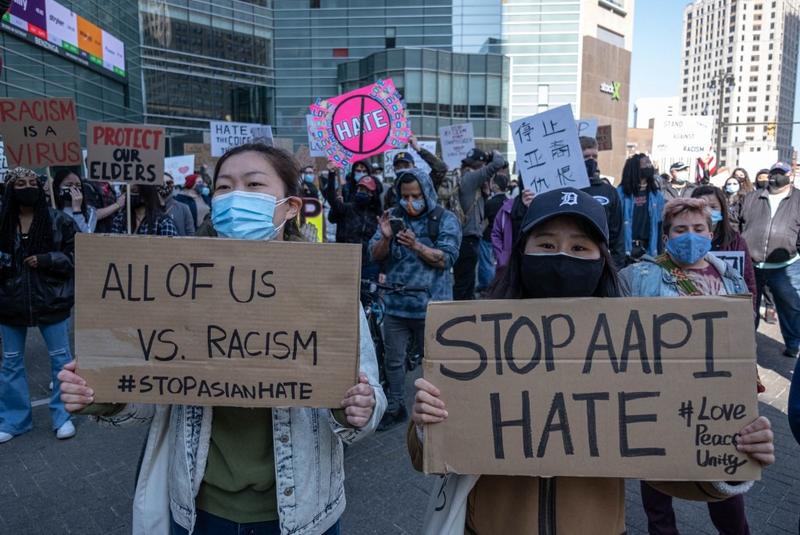 People march during a "Stop Asian Hate" rally in downtown Detroit, Michigan, on March 27, 2021, as part of a nationwide protest in solidarity against hate crimes directed towards Asian Americans in the wake of the Atlanta spa shootings. (SETH HERALD / AFP)
People march during a "Stop Asian Hate" rally in downtown Detroit, Michigan, on March 27, 2021, as part of a nationwide protest in solidarity against hate crimes directed towards Asian Americans in the wake of the Atlanta spa shootings. (SETH HERALD / AFP)
So long as there is rhetoric in politics portraying China as an enemy, Asian Americans will be targeted for abuse, said US Representative Judy Chu.
The California Democrat made the point in an online discussion on Monday organized by the National Committee on US-China Relations.
For speakers such as Jessica Lee, a senior research fellow in the East Asia program at the Quincy Institute, the current wave of hate crimes against Asian Americans extends beyond human rights issues. It has now become a matter with bearing on US foreign policy, Lee said.
During the discussion, the participants examined how anti-China political rhetoric has affected attitudes in the US and fueled violence against Asian Americans.
The language used about China in Washington created an atmosphere of deep anxiety toward people who look Chinese, said Jessica Lee, a senior research fellow in the East Asia program at the Quincy Institute
"Unfortunately, we see these trends building over the last couple of decades, where the US has come to view China as an economic and political adversary similar to how Russia was viewed during the Cold War," Chu said.
ALSO READ: Fighting prejudice and racism
She said that in the administrations of Barack Obama and Donald Trump, some Chinese-American scientists had been profiled as spies for China despite a lack of proof.
The situation worsened during the Trump presidency when he repeatedly used terms such as "China virus" and "kung flu" last year to link China and Chinese people to the virus, Chu said. She said Trump did that to distract from his handling of the pandemic.
Chu said that in March last year, when Trump began to use those terms, tracking data showed that anti-Asian language had increased by 900 times on Twitter.
Ian Shin, assistant professor at the University of Michigan, said that even though Trump has left office and President Joe Biden has not used the same rhetoric, it still exists in other branches of government and at the state and local levels.
READ MORE: Political figures stoke anti-Asian sentiment in US
"People continue to take this line of rhetoric to say this Wuhan virus or China virus. This language is not going away because people are latching onto it in a way of taking a tough position on China," Shin said.
Wake-up call
Lee said that shootings at a spa in the Atlanta area of Georgia in March were a wake-up call on the seriousness of the situation. Of the eight people killed, six were Asian-American women.
Lee said the language used about China in Washington created an atmosphere of deep anxiety toward people who look Chinese.
"Today a lot of what is being said about anti-Asian violence is largely framed around civil rights and human rights, but it only goes so far," Lee said.
"I am talking about people who think, 'Well, we need to be tough on China to protect our country; Asian Americans become collateral damage in the process, that's too bad because our country comes first'."
READ MORE: Action urged in US battle against racism
Lee said the labeling of a country as a threat and the use of zero-sum language will make US-China cooperation on issues such as climate change and pandemics extremely difficult politically.
The United States should accept the reality that the world order is a confluent, separate and sometimes contradictory force governing international affairs, Lee said.


